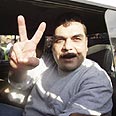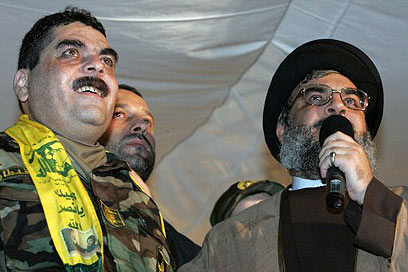
'Lebanon got a plump prisoner, we got bones in plastic bags'
Voices critical of Hizbullah respond to prisoner swap deal, including Kuwaiti columnist who says, 'Lebanon should thank God that Israel is its neighbor, rather than Saddam's Iraq'
A week has gone by since the implementation of the prisoner swap deal between Israel and Hizbullah, but the winds have not yet died down in Lebanon and the Middle East. Most of the Lebanese reactions commend Hassan Nasrallah and his organization, but a select few have uttered criticisms without reprieve.
One of those critical voices comes from Kuwait, a country that has despised Hizbullah ever since one of the organization's leaders, Imad Mugniyah, was involved in the abduction of a Kuwaiti plane in 1986, which killed two passengers.
Fouad al-Hashem, a columnist for the Kuwaiti daily Al-Watan, wrote that Lebanon should consider itself lucky to be blessed with a neighbor such as Israel, rather than Iraq, for example. "Samir Kuntar lived in Israeli prisons for 29 years," al-Hashem wrote.
"No one cut off his ears, tore out his fingernails, or raped him. He ate three meals a day, watched television, and read newspapers. He was even allowed to study at one of Israel's open universities, where he received an academic degree."
The columnist continued, "Pictures published following his release testify to his health. Now he can begin his new life by going to a restaurant, eating humus with pine nuts and meat, and smoking a hookah. He can even sip a glass of arrack and say, 'thank you, Israel' for being more humane than Saddam Hussein and his party of terror.
"Hizbullah and Kuntar's family should thank their maker for making Israel their neighbors rather than Hussein's Iraq. Otherwise, Kuntar would not have come back to his homeland on his feet, at a healthy weight of 90 kg, but rather in a little plastic bag containing a few bones, as our Kuwaiti prisoners returned to us."

Kuntar ceremoniously received by Nasrallah. (Photo: AFP)
Al-Hashem went on to say that despite the fact that the Kuwaiti prisoners were innocent, they were fed "pieces of bread as hard as rock" and "polluted water", and finally "led into the desert together, where they were murdered Nazi-style, and buried in mass graves without trial, law, attorneys, or involvement of the media."
Al-Hashem was not the only one critical of Nasrallah's accomplishment. Voices from within Lebanon also rose to the occasion. Al-Mustaqbal, a paper known for rivaling Hizbullah, challenged the organization's leader to answer for the 200 Lebanese prisoners that remained lost to Syria.
"I want to recall the issue of the Lebanese prisoners, detainees, and missing persons located in Syrian prisons since the mid '70s," columnist Abdullah al-Hadlak wrote. "Can the defeated terrorist leader of Hizbullah end the suffering of the families of these Lebanese prisoners and cause Damascus to bring an end to this subject, which has become the scarlet letter on its forehead?"
Referring to Nasrallah, he continued, "If he claims he won, I invite him to act with courage and fire one missile, or one shell towards the north of Israel. Maybe even to be brave and kidnap one Israeli soldier. If he does this, the gates of hell will open before him."
'Lebanon itself has become captive'
Other Lebanese criticism came from the Mufti of Mount Lebanon Sheikh Mohammed Ali al-Jouzoum, who has spoken out against Hizbullah in many instances. In a statement he published recently, the mufti claimed that the release of the five Lebanese prisoners has made Lebanon itself a captive.
"The Lebanese people rejoiced in welcoming the senior prisoner, Samir Kuntar, and his friends, but Hizbullah's hyperbolic propaganda had a political agenda beyond the release of the prisoners," al-Jouzoum wrote. "The release of prisoners is a grand thing, but in releasing a few prisoners from Israel the homeland itself has been taken captive by Hizbullah and Iran."
According to the mufti, Lebanon will now be unable to make a move that does not suit the organization. "If (the homeland) moves a little towards its own national interests in a way that does not suit Hizbullah… it will pay a hefty price as it did in July of 2006 and May of 2008," he said, referring to the Second Lebanon War and the Beirut riots, respectively.
He added that he did not despise Hizbullah's weapons when they were aimed towards the enemy. "When those weapons were aimed towards Israel I was proud, but now I feel that these weapons are aimed at the foundations of the country that has submitted to them," he concluded.










